Food Choices for Hernia: What to Eat and Avoid
By Dr. Pradeep Kumar N +2 more

Get,

to manage your symptom
Get your,


4 Cr+ families
benefitted

OTP sent to 9988776655



You’ve successfully subscribed to receive
doctor-approved tips on
Whatsapp

Get ready to feel your best.

Hi There,
Download the PharmEasy App now!!


Register to Avail the Offer
Send OTPBy continuing, you agree with our Privacy Policy and Terms and Conditions

Hi There,
Sign up on PharmEasy now!!
Trusted by 4 crore+ families

OTP sent to 9988776655



You have unlocked 25% off on medicines




Code: NU25
By Dr. Pradeep Kumar N +2 more
Table of Contents
Hernia is a condition that can affect anyone. It often develops when a weak spot in your muscles or fatty tissues pushes internal organs through and can lead to a noticeable bulge or swelling on the skin. Hernia can also cause severe pain. While there are various types of hernias, the most common in men is the inguinal hernia, where a portion of the intestines pushes through the inguinal canal near the groin or inner thigh area.
Managing your diet is important if you have a hernia. The right foods can help ease symptoms and prevent complications, while others may worsen your condition. This article covers the best & worst food options for better hernia management[5].
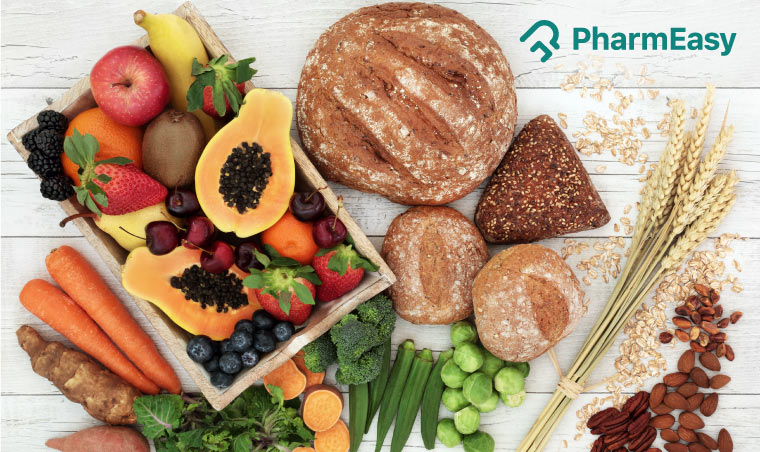
Friendly Reminder: The information shared here is for educational purposes only and the reader should consult a registered medical practitioner before implementing any changes to their health routine.
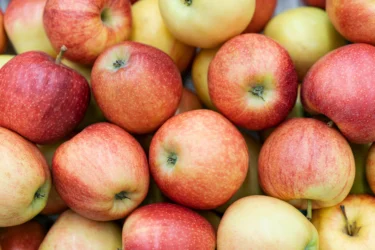
Fruits like bananas, apples [1], pears, and melons are good sources of nutrients and fibre. An increased fibre intake is necessary for smoother bowel movements and to avoid undue pressure on weak areas.

Spinach[8], green peas, methi (fenugreek), water spinach, and mustard leaves are excellent leafy green fibre options. Compared to other foods, these greens contain vitamins and minerals.
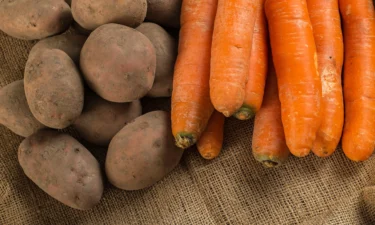
Carrots, sweet potatoes and cucumber are three high-fibre veggies to add to your diet. With more fibre, you can decrease your risk of constipation and ease the pressure your intestines undergo.
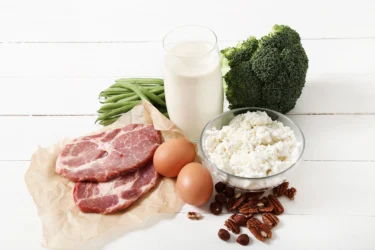
Protein is an essential nutrient for repairing and building tissues in the body. Many animal protein sources contain unhealthy fats, which can contribute to obesity. Increased weight can stress out your digestive system and strain your hernia further. Lean protein like skinless chicken, some fish, yoghurt, beans, lentils, sprouts salad, and low-fat milk can increase your protein intake without boosting your fat levels[1].
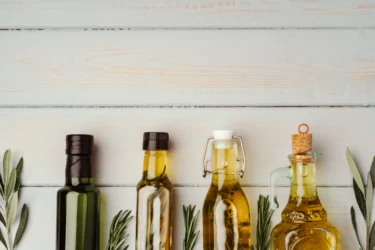
Certain oils contain high levels of trans fats that are very unhealthy for your overall health. Unhealthy cooking oils may also be involved with digestive issues and heartburn, both of which are bad news for people with a hernia. Opt for healthier oils like olive and coconut oil wherever possible.
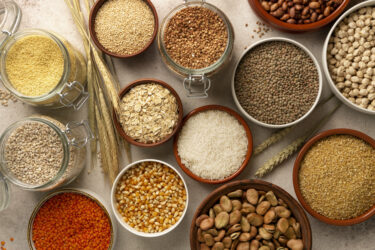
Whole grains are the best alternative to refined grains, flour and food items. Refined grains and their flour are often called empty carbs since they bring no fibre to your diet. Whole grains, on the other hand, are rich in nutrients and fibre[8].
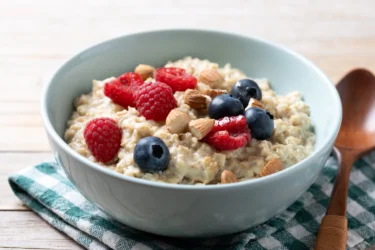
Oatmeal has numerous health benefits, including a high fibre content. However, oatmeal also benefits people with a hernia by being a low-acidic food. Acidic foods can increase your symptoms, but with oatmeal, you can decrease the chance of this occurring[8].

Water is required for nearly every cell in your body to function normally and is especially essential for smooth digestive function. Make sure you drink enough water every day without drinking too much at one time. Too much water in a short period can result in bloating and this may be painful if you have a hernia.
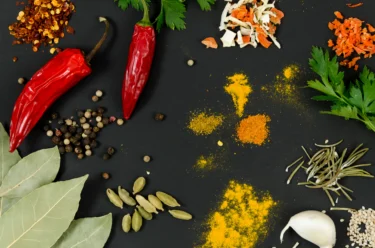
Nobody enjoys bland food, but when you have a hernia, you need to pay extra attention to the seasoning you use when preparing your food. Do not add excessive amounts of spicy, acidic powders since these can increase your pain when passing stools.
In my experience, I have observed that avoiding acidic condiments like tomato sauce can be beneficial for patients with hernia. These foods have the potential to irritate the hernia and worsen symptoms such as heartburn and regurgitation[6]. Based on what I’ve seen, I would advise you to opt for non-acidic alternatives to minimise discomfort and support your overall digestive health.
Dr. Rajeev Singh, BAMS
Eating a large portion of meals[7] puts sudden pressure inside your stomach, which may result in more pain from your hernia, particularly hiatal and umbilical hernias[2].
Did you know that eating a large meal can sometimes contribute to the occurrence of strangulated hernias? Strangulated hernias involve a segment of bowel becoming trapped and experiencing reduced blood supply, and the increased volume from a large meal can potentially aggravate this complication. So, it’s important to be mindful of portion sizes and maintain a healthy diet to minimise the risk of hernias.
Dr. Siddharth Gupta, B.A.M.S, M.D (Ayu)
Citrus foods can increase your risk of acidity and similar conditions (like GERD), which can affect hernia symptoms. Be cautious while consuming citrus and sour food[3].
Excessive consumption of alcoholic[4] beverages can lead to a host of health issues as well as digestive problems. Alcohol is a diuretic, meaning it makes your body pass more water than usual. You may end up dehydrated due to this, which can negatively impact your digestive system and any associated symptoms of hernia[3].
Although most people can benefit from more fibre in their diet, some foods contain excessive amounts of this nutrient. Mushrooms, cabbage, broccoli, onions, garlic, carbonated beverages and chewing gum may all contribute to higher levels of fibre and gas. In general, these should be avoided or limited as much as possible.
Wherever possible, saute, boil, or bake your food rather than deep-frying it. This will decrease your fat intake and be healthier for your digestive system.
Over the years, I have found that it is beneficial for patients with hernias to eat their meals at least three to four hours before lying down. I would also suggest to perhaps avoid bedtime snacks. When you lie down immediately after eating or consume snacks before bed, it can increase the pressure in the abdomen, potentially worsening the symptoms of a hernia.
Dr. Smita Barode, B.A.M.S, M.S.
Also Read: Eat These 10 Foods To Fight Fatigue!
When managing a hernia, choosing easy-to-digest, nutritious meals is key. Opt for simple recipes like khichdi, upma, dalia, dhokla, idli, and vegetable soups, all prepared with minimal oil and spices. While there aren’t many strict restrictions, focusing on healthy, easily digestible foods can help ease your symptoms. Here are two recipes you can try:
Also Read: 21 Healthy Benefits Of Almonds: Facts And FAQs
Avoiding certain food items plays a major role in managing Hernia, by reducing the risk of stomach problems, and supporting digestion. Nutrient-packed foods that support immunity and reduce inflammation can be beneficial. While diet won’t cure your hernia, it can help you manage it better. It’s always better to check with your doctor before making any changes to your diet or lifestyle.
Also Read: 10 Healthy Fat Foods That You Should Be Eating!
Alcohol, smoking and diabetes[4] have all been linked to the weakening of the cremaster muscle (which supports the testicle). This may worsen your existing hernia or increase the risk of developing one.
Yes, walking strengthens your body, especially your muscles and can encourage fewer symptoms. Walking may also be part of your recovery after hernia surgery.
Disclaimer: The information provided here is for educational/awareness purposes only and is not intended to be a substitute for medical treatment by a healthcare professional and should not be relied upon to diagnose or treat any medical condition. The reader should consult a registered medical practitioner to determine the appropriateness of the information before consuming any medication. PharmEasy does not provide any guarantee or warranty (express or implied) regarding the accuracy, adequacy, completeness, legality, reliability or usefulness of the information; and disclaims any liability arising thereof.
Comments

Leave your comment...
You may also like
Comments